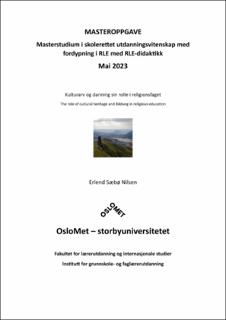| dc.description.abstract | Denne oppgaven tar for seg danning knyttet til ulike perspektiver på religion og kulturarv i det norske skolefaget KRLE. I oppgaven presenterer jeg ulike danningsteorier som et grunnlag for en analytisk presentasjon og drøfting rundt den danningsmessige verdien og betydningen av religion og kulturarv. Jeg drøfter også sammenhengen mellom disse begrepene innenfor en religionsfaglig danningskontekst. Problemstillingen er som følger: Er religion som del av kulturarv en god idé med tanke på danning i det norske skolefaget KRLE? Motivasjonen for oppgaven er knyttet til en nysgjerrighet rundt hvilke grunnleggende verdier som finnes i skolen, og hvilke oppfatninger av religion som er knyttet til forestillinger om norsk kulturarv i Norge. I innledningen, analysen og drøftingen belyses perspektiver på disse temaene fra didaktikere, fagdidaktikere, utdanningsforskere, historikere, filosofer, politikere og lekfolk. I den analytiske presentasjonen presenteres ulike perspektiver på danningstenkning knyttet til religion og kulturarv i den norske skolen, og det norske religionsfaget. I drøftingsdelen av oppgaven framstilles en alternativ danningstenkning som i stor grad er basert på den tyske allmenndidaktikeren Wolfgang Klafki sin danningsteori. Denne framstilles som en videreutvikling og utfylling av tenkningen omkring danning, slik den kommer fram i ulike norske læreplaner. Dette blir synliggjort gjennom den analytiske presentasjonen og tidlige drøftingen. Gjennom analysen og drøftingen kommer jeg til slutt fram til et ferdigstilt videreutviklet perspektiv på danningstenkning, basert på en pluralistisk og dynamisk oppfatning av kulturarv og verdier. Mot slutten av drøftingen presenterer jeg noen tilnærminger til undervisning i en religionsfaglig skolekontekst. Dette gjennom undervisningsopplegg bygget på en normativ og skjønnsmessig måte, og som forholder seg til den pluralistiske og dynamiske oppfatningen av kulturarv. Til sist foretar jeg denne tilnærmingen som et bidrag til en idé om skolen som en motkulturell institusjon i møte med samfunnsmessige utfordringer.
This thesis reflects upon formation education and how it relates to different perspectives on religion and cultural heritage in the Norwegian school subject of Christianity, Religion, Life/world views and Ethics (KRLE). The thesis presents different educational formation theories as a basis for an analytical presentation and discussion around the educational value and importance of religion and cultural heritage in religious education, as in regards to formation perspectives on education. I also discuss the relationship between religion and cultural heritage within a religious education context. The research question is as follows: Is religion as part of cultural heritage a good idea in terms of Bildung-centered education in the Norwegian school subject KRLE? The motivation for the thesis is related to my curiosity around the fundamental values that exist within Norwegian schools, and which perceptions of religion that are tied to notions of Norwegian cultural heritage. In the introduction, analysis, and discussion, I present perspectives on these themes from didacticians, subject didacticians, education researchers, historians, philosophers, politicians, and laypeople. In the analytical presentation, I present different perspectives on formation-educational thinking around religion and cultural heritage in the Norwegian school system and the Norwegian religious education subject. In the discussion section, I present an alternative Bildung-centered educational theory that is largely based on the German didactician Wolfgang Klafki's theory of Bildung-centered Didaktik. This theory is presented as a potential evolution formation ecucation perspectives within the current Norwegian curricula. This is presented through the analytical presentation and early parts of the discussion section. I ultimately end up with a perspective on formation-educational thinking based on a pluralistic and dynamic conception of cultural heritage and values. Towards the end of the discussion, I present some approaches to teaching within a religious education context. These teaching materials are built on a normative and phrónêsis based approach to teaching, which aligns with the pluralistic and dynamic conception of cultural heritage. Finally, I present this approach as a contribution to an idea of schools as countercultural institutions in the face of societal challenges. | en_US |
